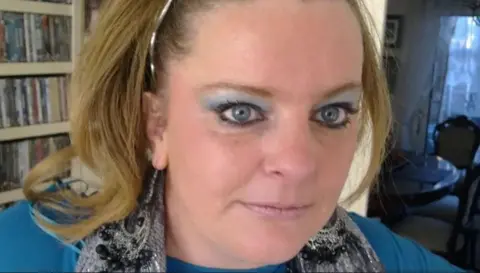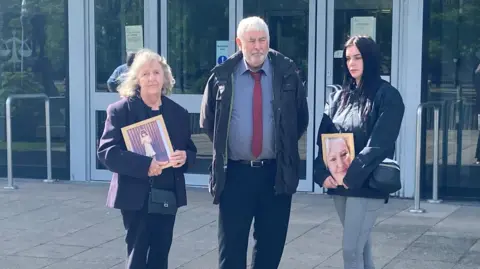Benefits cut led to mum of nine killing herself
 Supplied
SuppliedA housebound disabled woman killed herself when her mental health deteriorated due to her benefits being incorrectly stopped, a coroner has found.
Jodey Whiting, from Stockton-on-Tees, was found dead in 2017 two weeks after being deemed fit to work having missed an assessment because she was in hospital with pneumonia.
The senior coroner for Teesside, Clare Bailey, recorded a verdict of suicide due to a "deteriorating mental state" precipitated by the Department for Work and Pensions' (DWP) decision.
The DWP said it was "deeply regretful" after the inquest heard that Ms Whiting, 42, "had lost hope" at the time of her death.
Extracts from notes Ms Whiting left for family members were read at the hearing and said she could not pay her bills and had no food.
An initial inquest in May 2017 recorded a verdict of suicide but did not consider the actions of the Department for Work and Pensions (DWP) in stopping her benefits.
Her mother, Joy Dove, fought a long, legal battle for a second hearing, going all the way to the Court of Appeal.
Years of chronic pain
She told the inquest at Teesside Magistrates' Court, how her daughter, who had two sets of twins, suffered from a curvature of the spine and was later diagnosed with a brain cyst.
She dealt with chronic pain for years, developed drug dependency and had poor mental health.
A letter from the DWP was found among the unopened mail at Ms Whiting's flat asking why she had not attended a recent medical assessment.
Another letter telling her she was "fit to work" had arrived a month later.
As well as losing her Employment and Support Allowance (ESA), she would also lose housing and council tax benefits.

Giving evidence, 71-year-old Ms Dove said that when she saw her daughter, two days before her death, she was "shaking and crying" and had threatened to kill herself.
She told the hearing: "Jodey said, 'I can't breathe, I can't walk, I can't walk out of the door. What am I going to do?'
''She lost hope, she worried she wouldn't be able to pay her bills and have nothing to live on."
In letters left for her children, Ms Whiting wrote: "I've had enough, I want peace."
An Independent Case Examiner (ICE) report into the decision to remove Ms Whiting's benefits found a number of mistakes had been made, that her payments should not have been withdrawn and it recommended that the DWP pay £10,000 to her family.
Ms Dove added: "Her death really impacted on me.
"And to learn from the ICE reports of the number of failures by the DWP was to play was a further deep shock that I have not recovered from.
''It was the DWP that caused it. There's no way it was anything other."
Ms Whiting's father, Eric Whiting, said in his tribute in court she was like the "Pied Piper" as she always had children around her who adored her.
He said: "She always saw the fun side of life until her health issues started."
Helga Swidenbank, a DWP director for disability services, said the organisation should have recognised that Ms Whiting had "good cause" not to attend a health assessment.
She said: "I was not in post at the time but those who I have spoken to are deeply regretful about what happened."
Accepting that "a number of opportunities to have picked up concerns about Jodey" had been missed, Ms Swidenbank said the DWP was now focusing more on people's vulnerabilities".
She said: "There is a culture shift from being process-driven to being much more compassionate, but we still have more work to do."
The coroner cited evidence from psychiatrist Dr Trevor Turner who looked into the background of the case and said Ms Whiting losing her benefits was the "straw that broke the camel's back".
If you have been affected by any issues in this report, help and support is available on the BBC Action Line.
